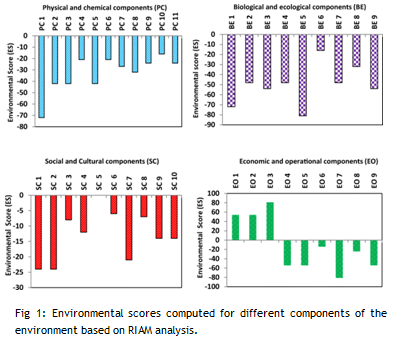 The increase in demand of building stones and construction-grade sand has resulted in aggressive hard rock quarrying in many parts of the world. The problems are to be evaluated in detail for the judicious use of resources on the one hand and ensuring health of the ecosystems on the other. The present study aims to evaluate the impact of hard rock quarrying on one of the important twin - river basins in SW India, the Netravati–Gurpur river basin, which hosts the fast developing urban centre, the Mangalore city. A total of 64 hard rock quarries are located in the basin which together extracts about 6.75 million t y−1 of rocks/rock products for different purposes. An assessment of the impacts of quarrying using the rapid impact assessment matrix (RIAM) reveals marginal, short-term positive impacts in economic-operational components but major negative impacts on all the other environmental components. The study indicates that the present intensity of quarrying is unsustainable with a sustainability index of − 0.25. Therefore, hard rock quarrying in the study area is to be strictly regulated for bringing down the river basin degradation to the barest minimum level and maximizing the ecosystem benefits to its full potential.
The increase in demand of building stones and construction-grade sand has resulted in aggressive hard rock quarrying in many parts of the world. The problems are to be evaluated in detail for the judicious use of resources on the one hand and ensuring health of the ecosystems on the other. The present study aims to evaluate the impact of hard rock quarrying on one of the important twin - river basins in SW India, the Netravati–Gurpur river basin, which hosts the fast developing urban centre, the Mangalore city. A total of 64 hard rock quarries are located in the basin which together extracts about 6.75 million t y−1 of rocks/rock products for different purposes. An assessment of the impacts of quarrying using the rapid impact assessment matrix (RIAM) reveals marginal, short-term positive impacts in economic-operational components but major negative impacts on all the other environmental components. The study indicates that the present intensity of quarrying is unsustainable with a sustainability index of − 0.25. Therefore, hard rock quarrying in the study area is to be strictly regulated for bringing down the river basin degradation to the barest minimum level and maximizing the ecosystem benefits to its full potential.
Bibliographic Info: Vandana, M., Shiekha E. John, Maya, K., Syam Sunny, Padmalal, D. [2020]. Environmental impact assessment (EIA) of hard rock quarrying in a tropical river basin - study from the SW India. Environmental Monitoring and Assessment, Vol. 192 (9), Art. 580. https://doi.org/10.1007/s10661-020-08485-x




 RTI Act
RTI Act

